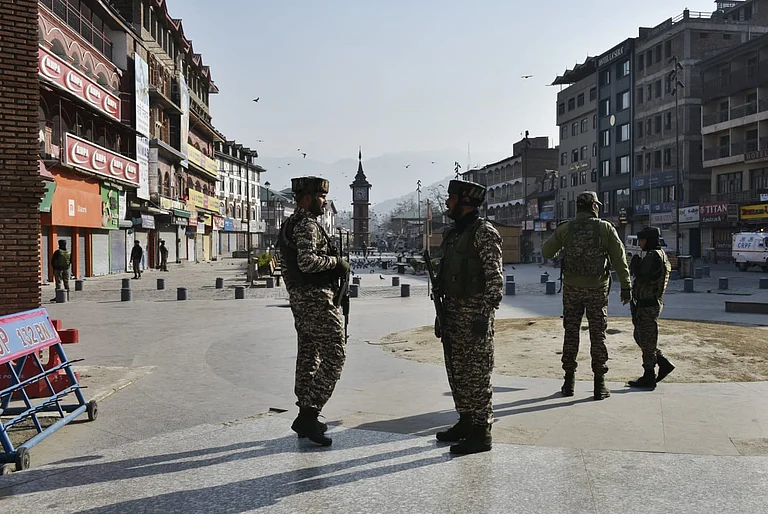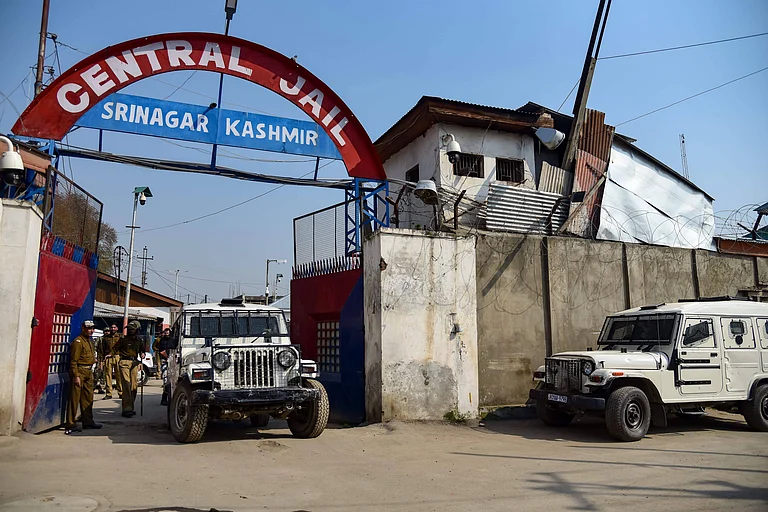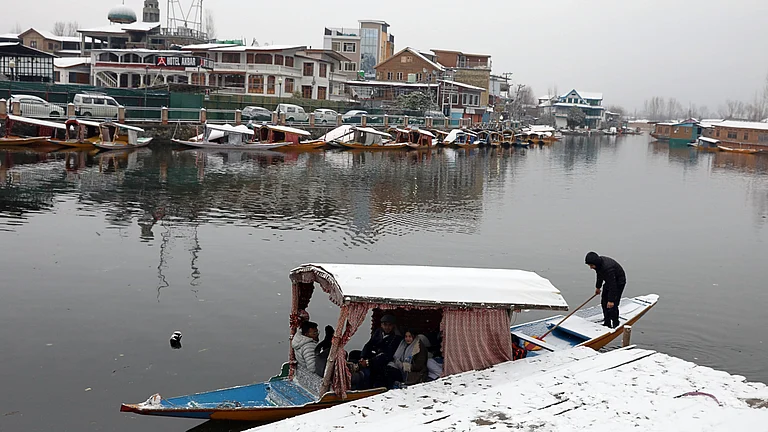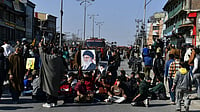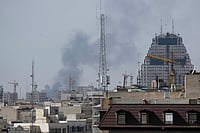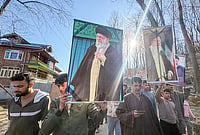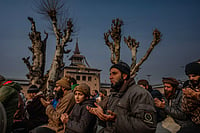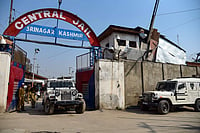People's Democratic Party leader Mehboob Beg often heard his father speak about the hard time Kashmiris faced during the feudal rule of Dogras. His father, Mirza Afzal Beg, was among the few in who shaped the history of the Valley; he went to plead for more rights for the Kashmiris with the British Raj and raised the issue of people being subjected to forced labour in Kashmir.
He became the first cabinet Minister in Dogra rule and resigned within two years, as he believed that Kashmiris continued to be denied jobs and the economic condition of common people remained poor.
Mehboob, a suave man who left the National Conference to join PDP in 2014 after withdrawing his candidature in favour of former chief minister Mufti Mohammad Sayeed, has an emotional bond with the martyrs’ graveyard. Before the abrogation of Article 370, he would make sure that he attended the ceremony to pay homage at the graveyard.
Now, with authorities barring the movement of people to the graveyard in Srinagar, which is a practice after the revocation of Article 370, Beg couldn’t pay his last respects. Former CM and NC president, Farooq Abdullah, are among the several leaders who have been placed under detention in Kashmir.
“It was after the 1931 protest in which people died, who were fighting against the policies of subjugation, that my father pleaded for more rights with the British, and he became a Cabinet Minister. But the condition of people didn’t improve and the practice of forced labour was loathed on,” he said.
1931 is seen as a watershed moment in Kashmir’s history that saw the formation of the Muslim Conference before it was converted into the National Conference, and for many, memories of the feudal time remain etched.
"People were treated like slaves and subjected to forced labour. The conditions were so bad that in 1832 there were eight lakh people and then a famine came and the numbers were reduced by nearly half," said Mustafa Kamal, son of NC founder Shiekh Mohammad Abdullah, who saw his father often being sent to prison along with Mirza Afzal Beg as they founded the Plebiscite Front, that later saw the emergence of separatist politics in Kashmir.
“We fought against the Dogras for the restoration of our democratic rights. But what kind of democracy is it now that we have been locked up in our houses,” said Kamal, who added that besides the several party leaders, both the CM and NC president have been placed under house arrest.
Kashmiri political leaders have denounced the curbs on them and said that they were placed under house arrest to restrict them from paying homage to the July 13, 1931, martyrs here.
Leaders from both the ruling National Conference and opposition People’s Democratic Party (PDP) and People’s Conference, and Apni Party said that they were denied permission to visit the martyrs’ graveyard to pay respects.
Chief Minister Omar Abdullah termed the curbs on the public and political leaders as “blatantly undemocratic.”
“In a blatantly undemocratic move, homes have been locked from the outside, police and central forces deployed as jailers, and major bridges in Srinagar blocked. All to stop people from visiting a historically important graveyard containing the graves of people who laid down their lives to give Kashmiris a voice and to empower them,” Omar said in a social media pos. In an apparent dig at the LG administration, he added, “I will never understand what the Law & Order government is so afraid of.”
On Saturday, police stated that violating its orders restricting people from moving to Khawaja Bazar, Nowhatta, in downtown Srinagar will invite legal action. Restrictions remained in place in the old city areas where the martyrs' graveyard is located in the precincts of the shrine of Khwaja Bahawuddin Naqshbandi.
According to police, the district administration of Srinagar denied permission to all applicants intending to proceed towards Khawaja Bazar and accordingly urged the general public to strictly comply with these instructions and refrain from violating the orders. Political parties, including the ruling NC and PDP, had applied for permission to visit the graveyard.
PDP leader Iltija Mufti said Saturday that she paid tributes to the 1931 “ martyrs” as she had an inkling that she would be denied permission to visit the graveyard. Iltija went to the graveyard and showered flower petals while former chief minister and PDP president, Mehbooba Mufti, shared pictures of locked up gates of several of its leaders.
“The day you accept our heroes as your own, just as Kashmiris have embraced yours, from Mahatma Gandhi to Bhagat Singh that day, as Prime Minister Modi once said, the ‘dil ki doori ‘ (distance of hearts) will truly end. When you lay siege to the martyrs’ graveyard, lock people in their homes to prevent them from visiting Mazar-e-Shuhada, it speaks volumes. July 13th commemorates our martyrs, those who rose against tyranny, much like countless others across the country. They will always be our heroes,” she said.
Mehbooba said that several party leaders, including those who managed to come out of their homes, have been detained in police stations. “They were on their way to Mazar-e-Shohda. It seems we are getting back into the oppressive times that our 13 July martyrs fought against,” she said.
NC chief spokesperson Tanveer Sadiq said that he, as well as the Advisor to chief minister, Nasir Sogami, and a majority of sitting MLAs, have been locked inside their homes.
“This is not just unfortunate; it is a deliberate attempt to suppress remembrance and deny us the right to honour the martyrs of July 13. Such actions are not only unnecessary, they are unjustified, deeply insensitive, and reveal a troubling disregard for history,” he said.
Former Minister and Apni Party President, Altaf Bukhari, termed the police action to bar the leaders from visiting the martyrs' graveyard as “high-handedness.”
“After being denied permission to visit Mazar-e-Shuhada in Naqshband sahib, Srinagar—where we intended to pay homage to the martyrs of 1931—the authorities have now gone a step further by locking the Apni Party headquarters in Srinagar to prevent us from holding a prayer event in their memory. Also, police personnel in large numbers have been deployed near my residence in Sheikh Bagh, Srinagar, so that I cannot reach my colleagues and participate in the planned prayer meeting at our office. I have also been informed that police personnel have been stationed at the homes of several of our leaders and senior workers, blocking their participation in today’s martyrs' day commemorations. These measures are clear and blatant examples of highhandedness and authoritarian behaviour by the administration.”
“What is the purpose of stopping us from commemorating martyrs' day, and how does it serve the authorities? Today, our only intention was to visit Mazar-e-Shuhada to pay tribute to the martyrs and then hold a peaceful prayer meeting in their memory. As peace-loving and law-abiding citizens, we would have carried out these activities quietly, without causing any disruption to law and order. I am deeply disappointed by the administration’s conduct. That said, no level of suppression can diminish our reverence for these martyrs. Their memory lives on in our hearts, and no barriers can prevent us from honouring them from the depths of our hearts. I leave it to the people’s sense of justice to judge whether the administration's actions today were fair or unjust,” he added.
People’s Conference President, Sajad Lone, said that he has been detained and placed under house arrest to bar him from visiting the martyrs’ graveyard.
“I don’t know why the Union government is so keen to redefine what is sacred for the people of Kashmir. The sacrifices rendered on July 13 are sacred for all of us. Denigrating these sacrifices and stopping everyone from going to the martyrs’ graveyard, if anything elevates these sacrifices to a new high. Histories that are etched in blood don’t vanish,” he said.







